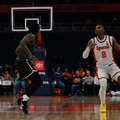Rose Cano brings 2-way prowess to SU after transfer

Rose Cano established her two-way dominance at the Orange County Batbusters, which she's since carried into college. Leonardo Eriman | Asst. Video Editor
Get the latest Syracuse news delivered right to your inbox. Subscribe to our sports newsletter here.
Rose Cano wasn’t supposed to pitch. She hadn’t warmed up. She wasn’t even on the radar to enter the game.
But there she stood on March 23, 2024, — toeing the rubber for George Washington with two runners on, one out and an 8-8 tie against Dayton.
Moments earlier, Cano had been standing at second base, helplessly watching an 8-1 lead transform into an 8-8 tie in the bottom of the seventh. Now, she was GW’s last hope to stop the bleeding.
She needed just two batters to escape the jam, sparking the Revolutionaries’ eventual 11-8 win in the 10th inning.
“(A pitcher only) is not something I’d ever say I am,” Cano said. “I like to be very versatile.”
That versatility has defined Cano’s journey — from a YouTube-taught pitcher in Long Beach, California, to a two-way standout in the Atlantic 10 and now, a reliable arm for Syracuse softball. This season, she’s become SU’s third starting pitcher, slotting in behind Madison Knight and Julianna Verni with four starts. Though she’s pitched just 23.1 innings, she also holds SU’s best earned run average at 2.40.
Yet Cano wasn’t always a pitcher. In fact, she originally hated softball.
Cano stumbled into the sport by accident. A flyer for a local rec league caught her eye when she was 7. But because it was her first year playing, she was placed in a T-ball league with 4 and 5-year-olds. She stuck out and not in a good way.
The league’s slow pace soured her on the game. She preferred soccer. But her parents had already signed her up for a second season, so she returned — reluctantly.
In the infancy of her second season, she watched one of her teammates pitch for the first time. Something about the motion, the mechanics, the power of it stood out. Pitching wasn’t just a position. It was a challenge.
“I think when she saw the pitching and how natural it came to her, I feel that’s what changed her mind about softball,” Courtney Quevedo, Cano’s mother, said.

Rose Cano stands at the plate in Syracuse’s game against North Carolina in March. Cano, who also pitches, has amassed a team-leading 2.40 earned run average in her first year with the Orange. Leonardo Eriman | Asst. Video Editor
Cano rushed home and immediately opened YouTube. She binge-watched tutorials from former Texas A&M All-American Amanda Scarborough to build her arsenal from scratch. Cano taught herself how to throw five pitches — a fastball, changeup, rise, drop and screwball — while her parents had zero clue how good she was becoming.
“She had an older brother that was playing baseball as well. And I was more focused on that,” Cano’s father, Jose, said. “We had just put her there, kind of as a thing to keep her busy. I had no idea she was doing all this on her own.”
By age 10, Cano had become too good for rec ball. Her parents connected with Bobby Flores, a coach with the elite Orange County Batbusters, and she began attending weekly workouts. Cano was hooked.
“As soon as the end of her first practice, she loved it,” Quevedo said. “That was the best thing we could have done for her.”
Soon, she was throwing too hard for her parents to catch. So, they reached out to Richard McArthur, the Batbusters’ most in-demand pitching coach. He typically avoided working with young kids, but Cano’s parents persisted.
McArthur relented, taking time to evaluate her. Jose pulled her out of school early for the appointment. When McArthur asked how many pitches she had, Cano coolly responded, “Five.” He didn’t believe her. Then he saw them.
By the end of the session, McArthur was convinced. He told Jose to keep bringing her back.
Over the next two years, Cano became the Batbusters’ ace. However, the team discouraged players from playing both ways. Cano, who also loved to hit and play shortstop, wasn’t ready to give that up. At 13, she joined Athletics Mercado, where she could keep doing both.
“I loved hitting when I played shortstop, so I wanted to continue doing it if I pitched a lot,” Cano said. “So as I grew older, I just made sure that I did both on any team that I was on.”
Still, the Batbusters felt like home. After getting regular at-bats for St. Anthony’s High School (California), she didn’t need to play both ways in travel ball. So, she returned after two years.
For Cano, St. Anthony’s was like an oasis. Travel ball was more intense, a trait she generally relished. But she enjoyed playing in an atmosphere where winning wasn’t life or death.
“High school ball was fun for her. She didn’t take it too seriously,” Quevedo said. “(Her friends) all played in other organizations, but she finally got to have them all on one field with her.”
She’s always wanted the challenge. She's always wanted something that will physically and mentally test her. She's just a different breed.Courtney Quevedo, Rose Cano’s mother
By her sophomore year, Power Four schools like Auburn and Northwestern were calling. But then came COVID-19. A pinched nerve in her shoulder disrupted her mechanics, and the momentum faded.
George Washington ended up being her only Division I offer. But it checked key boxes — strong academics and a place where she could make an immediate impact.
“She just felt like, ‘Maybe it’s a sign that this is where I should be,’” Quevedo said. “I think at the time, it was the one.”
Cano wasted no time proving herself. As a freshman, she pitched 194 innings, posted a 2.81 ERA, hit .287 in 122 at-bats and earned Atlantic 10 All-Rookie First Team honors. But her sophomore year was a mixed bag. While Cano’s batting average jumped to .337, her ERA also increased over a full run in just 72.0 innings. And despite making the A-10 All-Conference First Team as a utility player, her season was cut short after she re-aggravated a hamstring strain.
Away from the field, there was also growing discontent between GW’s coaching staff and some of the team’s veterans. Parents of established players, who were inherited from the previous regime, had begun to complain about playing time.
Cano enjoyed the coaches, but the environment had changed. She still dreamed of competing at the sport’s highest level. And the aforementioned tension pushed her to enter the transfer portal.
“She didn’t like seeing that,” Jose said. “That becomes another issue that doesn’t need to be there, and it affects team chemistry.”
Initially, she planned to return to California and transfer to Loyola Marymount. But when she learned she couldn’t continue her Arts and Sciences degree there, she pivoted.
Will Loredo, Syracuse’s hitting coach, stepped in. He’d previously coached Cano with Athletics Mercado, and he expressed interest right after she hit the portal. Once LMU fell through, he reconnected. Soon after visiting SU, she committed.
Hamstring issues have limited her offensive reps this season, but Cano’s found something deeper at Syracuse — a sense of belief. SU’s staff trusts her to deliver, even in the tightest of moments.
Just like that March afternoon in Dayton, when she was thrown into chaos without warning, Cano has never needed perfect conditions to perform. She just needs the ball.
“She’s always wanted the challenge. She’s always wanted something that will physically and mentally test her,” Quevedo said. “She’s just a different breed.”






